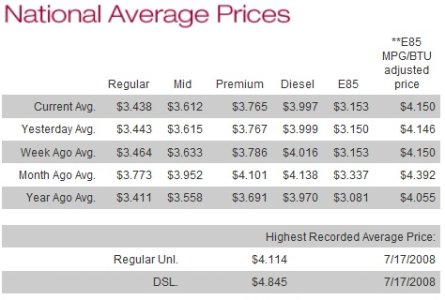-
The Forum works well on MOBILE devices without an app: Just go to: https://forum.tsptalk.com
-
Please read our AutoTracker policy on the IFT deadline and remaining active. Thanks!
-
$ - Premium Service Content (Info) | AutoTracker Monthly Winners | Is Gmail et al, Blocking Our emails?
Find us on: Facebook & X | Posting Copyrighted Material
-
Join the TSP Talk AutoTracker: How to Get Started | Login | Main AutoTracker Page
You are using an out of date browser. It may not display this or other websites correctly.
You should upgrade or use an alternative browser.
You should upgrade or use an alternative browser.
Oil Slick Stuff
- Thread starter nnuut
- Start date
nnuut
Moderator | TSP Talk Royalty
- Reaction score
- 210
That's really fast Supply and Demand changes for one day.:nuts:Gas today; went from $2.97, to $2.99, then to $3.09 all between 7am to 5 pm.
nnuut
Moderator | TSP Talk Royalty
- Reaction score
- 210
nnuut
Moderator | TSP Talk Royalty
- Reaction score
- 210
nnuut
Moderator | TSP Talk Royalty
- Reaction score
- 210
nnuut
Moderator | TSP Talk Royalty
- Reaction score
- 210
nnuut
Moderator | TSP Talk Royalty
- Reaction score
- 210
Industry Looks Ahead to Energy Policy under a Second Obama Term
by Karen Boman
|
Rigzone Staff
|
Wednesday, November 07, 2012
RIGZONE - Industry Looks Ahead to Energy Policy under a Second Obama Term
by Karen Boman
|
Rigzone Staff
|
Wednesday, November 07, 2012
RIGZONE - Industry Looks Ahead to Energy Policy under a Second Obama Term
nnuut
Moderator | TSP Talk Royalty
- Reaction score
- 210
Interior proposal would limit commercial oil shale development on federal lands in West
By Zack Colman
11/09/12 02:07 PM ET
The Interior Department on Friday issued a final plan to close 1.6 million acres of federal land in the West originally slated for oil shale development.
The proposed plan would fence off a majority of the initial blueprint laid out in the final days of the George W. Bush administration. It faces a 30-day protest period and a 60-day process to ensure it is consistent with local and state policies. After that, the department would render a decision for implementation.
The move is sure to rankle Republicans, who say President Obama’s grip on fossil fuel drilling in federal lands is too tight.
Interior’s Bureau of Land Management cited environmental concerns for the proposed changes. Among other things, it excised lands with “wilderness characteristics” and areas that conflicted with sage grouse habitats.
Interior proposal would limit commercial oil shale development on federal lands in West - The Hill's E2-Wire
By Zack Colman
11/09/12 02:07 PM ET
The Interior Department on Friday issued a final plan to close 1.6 million acres of federal land in the West originally slated for oil shale development.
The proposed plan would fence off a majority of the initial blueprint laid out in the final days of the George W. Bush administration. It faces a 30-day protest period and a 60-day process to ensure it is consistent with local and state policies. After that, the department would render a decision for implementation.
The move is sure to rankle Republicans, who say President Obama’s grip on fossil fuel drilling in federal lands is too tight.
Interior’s Bureau of Land Management cited environmental concerns for the proposed changes. Among other things, it excised lands with “wilderness characteristics” and areas that conflicted with sage grouse habitats.
Interior proposal would limit commercial oil shale development on federal lands in West - The Hill's E2-Wire
nnuut
Moderator | TSP Talk Royalty
- Reaction score
- 210
nnuut
Moderator | TSP Talk Royalty
- Reaction score
- 210
nnuut
Moderator | TSP Talk Royalty
- Reaction score
- 210
nnuut
Moderator | TSP Talk Royalty
- Reaction score
- 210
nnuut
Moderator | TSP Talk Royalty
- Reaction score
- 210
I can understand why he feels that way considering our administration's policies.:nuts:
OPEC Chief Says US Won't Stay Self-Reliant on Oil
by Dow Jones Newswires
|
Benoit Faucon
|
Tuesday, November 13, 2012
OPEC Chief Says US Won't Stay Self-Reliant on Oil
by Dow Jones Newswires
|
Benoit Faucon
|
Tuesday, November 13, 2012
RIGZONE - OPEC Chief Says US Won't Stay Self-Reliant on OilLONDON - OPEC's chief on Tuesday cautioned crude-producing countries against cutting spending on projects to boost their capacity in response to an International Energy Agency report predicting the United States will not need to import oil in the future
nnuut
Moderator | TSP Talk Royalty
- Reaction score
- 210
nnuut
Moderator | TSP Talk Royalty
- Reaction score
- 210
nnuut
Moderator | TSP Talk Royalty
- Reaction score
- 210
nnuut
Moderator | TSP Talk Royalty
- Reaction score
- 210
Tax Incentives At Risk As Bridge Funding for Fiscal Cliff
by Karen Boman
|
Rigzone Staff
|
Thursday, November 15, 2012
RIGZONE - Tax Incentives At Risk As Bridge Funding for Fiscal Cliff
by Karen Boman
|
Rigzone Staff
|
Thursday, November 15, 2012
.Tangible drilling credits and other tax incentives that apply to integrated and supermajor oil companies face the near-term risk of being targeted by U.S. Congress to solve the pending U.S. fiscal cliff, said industry officials at a Deloitte Oil & Gas Conference in Houston Tuesday.
The loss of the tax treatments as a way to bridge the financial gap in the fiscal cliff would likely occur as part of a deal of good faith in the context of broadening the tax base and lowering the corporate tax rate. This would apply not only to drilling credits but to master limited partnerships, said Christine Tezak, managing director of research at ClearView Energy Partners.
The oil and gas industry "should not expect a lot of favors" from the Obama administration, said Barry K. Worthington, executive director of the United States Energy Association, during a panel discussion of energy's potential role in solving the potential financial crisis as well as energy topics to be focused on in a second Obama term.
Any tax credits that are favorable to the oil and gas industry would likely have to be paired with incentives for wind and solar. When it comes to seeking revenue sources to address the U.S. fiscal cliff, the oil and gas industry will likely be viewed as the largest hen in the henhouse and the biggest source for funds, said one panelist
RIGZONE - Tax Incentives At Risk As Bridge Funding for Fiscal Cliff
nnuut
Moderator | TSP Talk Royalty
- Reaction score
- 210












